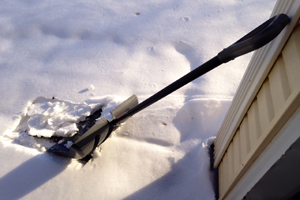

Winter work increases risks of heart attack, stroke.
By Mercy's Brad Haller
Just when we thought the snow shovels and sleds wouldn't see the light of day this winter, the white stuff is finally expected to accumulate this weekend.
“Snow shoveling is probably the most strenuous activity under the worst possible conditions,” said Mercy’s Dr. Michael Roselman. He recommends all heart patients avoid strenuous activities outdoors, and urges everyone to be extra careful to avoid heart attacks or strokes.
“When a person is out in below-freezing temperatures, they’re breathing in cold air. That automatically starts a process where blood vessels constrict, making blood supply more limited.” On top of that, the body works extra hard to stabilize when shoulder muscles are used to lift snow. “Together, that’s very stressful on the cardiovascular system.”
Even with a clean bill of health, shoveling snow in extreme cold may bring shortness of breath and a tightening in the chest. This may be the first indication that you need to stop immediately and monitor those symptoms. “Bottom line: pay attention to your body signals,” added Dr. Roselman. “If you’re overdoing it, your body is going to tell you. You’ll get very winded. Pay attention to your level of fatigue. Go inside and wait five to 10 minutes. If it persists, you’ll want to seek emergency care.”
A heart attack can include the following:
- Discomfort in the chest, arms, back, neck, jaw or stomach
- Shortness of breath
- Cold sweat
- Nausea or lightheadedness
The warning signs of a stroke include:
- Numbness or weakness in the face, arm or leg (especially on one side of the body)
- Confusion, trouble speaking or understanding
- Trouble seeing in one or both eyes
- Trouble walking, dizziness, loss of balance or coordination
- Severe headache with no known cause
“Also, many people have their spouse drive them to the emergency room, but that’s a mistake,” said Dr. Roselman. “If you go under cardiac arrest in the car, you need someone experienced to take care of you.”
If you have to be outside in the cold temps, be sure to dress in multiple layers, not just a single, thick layer; wear a hat and gloves and avoid physical overexertion. “Have your mouth and nose covered up with some sort of ski mask or scarf,” said Dr. Roselman. “It will heat the air as you’re breathing and warm air will go into the respiratory tract. It allows you to stay out longer, because you’re breathing in heated air.”
But Dr. Roselman says just to play it safe and know your body before you burden it with winter chores.

